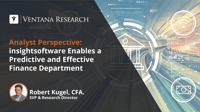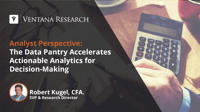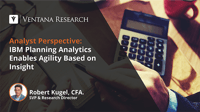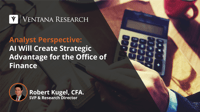insightsoftware provides applications for finance departments and other business users in midsize and larger organizations, offering a broad range of functions including analysis, internal and regulatory reporting, planning, consolidation, tax provision and treasury. The software brings together applications that enable business users to maximize data collected in existing systems and streamline the performance of a range of office of finance functions, all while limiting or eliminating the...
Read More
Topics:
Office of Finance,
embedded analytics,
Business Intelligence,
Business Planning,
Financial Performance Management,
ERP and Continuous Accounting,
digital finance,
profitability management,
Revenue, Lease and Tax Accounting
Ventana Research recently announced its 2023 Market Agenda for the Office of Finance, continuing the guidance we have provided since 2003 on the practical use of technology for the finance and accounting department. Our insights and best practices aim to enable organizations to operate with agility and resiliency, improving performance and delivering greater value as a strategic partner.
Read More
Topics:
Office of Finance,
Business Planning,
Financial Performance Management,
ERP and Continuous Accounting,
digital finance,
profitability management,
Revenue, Lease and Tax Accounting
Ventana Research uses the term “data pantry” to describe a method of data storage (and the technology and process blueprint for its construction) created for a specific set of users and use cases in business-focused software. It’s a pantry because all the data one needs is readily available and easily accessible, with labels that are immediately recognized and understood by the users of the application. In tech speak, this means the semantic layer is optimized for the intended audience. It is...
Read More
Topics:
Continuous Planning,
Business Intelligence,
Data Management,
Business Planning,
Data,
Financial Performance Management,
Enterprise Resource Planning,
continuous supply chain,
data operations,
digital finance,
AI & Machine Learning,
profitability management,
Analytics & Data,
Streaming Data & Events
The starting point of an era is never precise and rarely conforms to neat calendar delineations. For example, the start of the 20th century is associated with the outbreak of war in 1914. So I expect that decades from now, the consensus will hold that what became known as the 21st century began in the year 2020, with the pandemic serving as a catalyst that accelerated already existing trends and forced changes to prevailing norms and practices. This and other disruptive events that have...
Read More
Topics:
Office of Finance,
Business Intelligence,
Business Planning,
Financial Performance Management,
digital finance,
AI & Machine Learning,
profitability management,
operational data platforms
IBM Planning Analytics with Watson is a comprehensive, cloud-based business planning application that supports what Ventana Research calls integrated business planning. We coined this term in 2007 to describe a high-participation approach to business planning that integrates strategy, operations and finance. Our Next Generation Business Planning Benchmark Research demonstrated the value of IBP: Organizations that link planning processes get better results. Sixty-six percent of organizations...
Read More
Topics:
Predictive Analytics,
Office of Finance,
embedded analytics,
Business Intelligence,
Business Planning,
Financial Performance Management,
Watson,
Digital transformation,
digital finance,
AI & Machine Learning,
profitability management
A year ago, I wrote about how technology could be useful in an inflationary period, correctly anticipating the world we live in now. Responding effectively to changes in costs is always challenging, but even more so because of the choppy and chaotic nature of the current environment. Many organizations have a limited or no ability to raise prices, and are forced to find ways to minimize the impact of rising costs. And while it’s true that some organizations have a degree of pricing power,...
Read More
Topics:
Office of Finance,
Financial Performance Management,
digital finance,
Revenue Management,
profitability management,
Revenue Performance Management
Anaplan offers a cloud-based business planning platform that incorporates a modeling and calculation engine. The tool makes it relatively easy to add or expand the scope of plans that can be connected and monitored on a single platform. This Integrated Business Planning (IBP) approach enables organizations to use the software for financial planning or budgeting, sales, supply chain, workforce, marketing and IT planning. These are the types of plans in which companies often need to create models...
Read More
Topics:
Office of Finance,
Continuous Planning,
Business Intelligence,
Business Planning,
Financial Performance Management,
continuous supply chain,
digital finance,
AI & Machine Learning,
profitability management
OneStream offers a platform designed to serve the needs of accounting and financial planning and analysis organizations. The software handles financial close and consolidation, planning and budgeting, analysis and reporting. For me, the most significant announcement at the company’s recent user conference was the unveiling of its Sensible ML (Machine Learning) offering, which is in limited general release. I’ve commented on the importance of artificial intelligence in business applications, and...
Read More
Topics:
Business Planning,
Financial Performance Management,
ERP and Continuous Accounting,
digital finance,
AI & Machine Learning,
profitability management
Artificial intelligence using machine learning has passed through the bright, shiny object stage and software vendors are well into the process of making the concept a reality in their offerings. Ventana Research defines AI as the use of technology to process information in much the way humans do, including improving accuracy in recommendations, actions and conclusions as more data is received. I like the alternative term “augmented intelligence” because it emphasizes that these systems enhance...
Read More
Topics:
Planning,
Machine Learning,
Budgeting,
Business Planning,
Financial Performance Management,
forecasting,
digital finance,
AI & Machine Learning,
profitability management
Ventana Research recently announced its 2022 Market Agenda for the Office of Finance, continuing the guidance we have offered since 2003 on the practical use of technology for the finance and accounting department. Our insights and best practices aim to enable organizations to operate with agility and resiliency, improving performance and delivering greater value as a strategic partner.
Read More
Topics:
Office of Finance,
Business Intelligence,
Collaboration,
Business Planning,
Financial Performance Management,
ERP and Continuous Accounting,
Revenue,
blockchain,
robotic finance,
Predictive Planning,
lease and tax accounting,
AI & Machine Learning,
profitability management



















